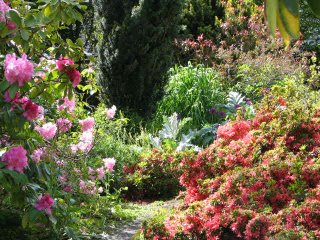How To Have a Better Garden Than the Neighbors

The deal here is quite simple. Some writers believe you garden because you enjoy it – because you think it’s fun, spiritual, good exercise, on and on ad-nauseum.
We both know the real reason you garden is to show your neighbors you’re better at something than they are – even if their name is Jones.
But you can’t quite get it right. So here’s my ten best tips for making sure you have a better garden than those idiots next door.
And while they may sound anti-competitive on the surface, when you understand the power of these suggestions, you’ll understand this is training to get into the “zone of gardening”. And once you’re in that zone, nobody named Jones is going to be good enough to do your weeding.
1. Relax. Gardening is supposed to be enjoyable. I find too many folks bring an office or work mentality to the garden. Gotta get it done, gotta make it perfect, gotta … well, they just gotta. It is one of the last ways that nature has to touch our urbanized souls and if we are too busy or compulsive to listen to the message, then we are the losers. Perfection has no place in my garden and eaten leaves and the odd weed here and there, and even there again, are just part of the overall reflection of my soul in the garden.
There is no gotta get it done, gotta make it perfect that makes one iota of sense to me. Gardeners have a symptom I’ll refer to as garden anorexia – it’s the same form of problem that bothers young women.
Gardeners **have** to be picture perfect, young women **have** to be thin. Both problems stem from unreasonable expectations created by a photographic media. We understand that one is a disease yet we don’t see the one that influences us.
2. Have a place to sit in the garden. Without a place to sit down, the only time you’ll go into the garden is when you have work to do. You won’t sit down and just listen to the voices out there.
I named my boat Choir because of all the voices that surround me in nature. These voices sing to me (or complain to me) :-) but they are there and I only hear them when I take the time to sit and listen. I seldom hear them when I’m in my clean-up mode. Oh, I know they are there and I have to acknowledge their existence by the way that I behave in my garden but I don’t listen to them when I’m trying to get the weeding done before our dinner guests arrive. I do hear them when I sit down.
3. Get rid of the garden chemicals. For twenty years now, I’ve gardened and run a nursery without any noxious chemicals in my outdoor gardens. If I can do on a commercial scale, why can’t you do it on a home gardening scale?
Let me be clear. Sure I’ve lost plants to insects. Sometimes the caterpillars got ahead of me and decimated a columbine or other plant. But and this is the big BUT, they are part of the foodweb as well as I am. Without the caterpillars, I wouldn’t have butterflies. Without the aphids, I wouldn’t have hummingbirds. Without the grubs, I wouldn’t have birds.
Each of these creatures has as much right to life as I do and has a voice to contribute to the garden. I don’t have as many garden problems as many of my chemical gardening friends because I have a complete foodweb chain existing in my garden. The small insects eat the smaller insects, the birds eat the larger insects. It all goes round.
I see no need to spray stuff on the ground where my pets and feet bring it into the house to become incorporated into my life. I might lose plants but I do not lose my sense of humour or sense of what is right and wrong in my garden.
4. Use compost. Ahh, compost. I’ve written several articles about this stuff and the more I write and study its effects, the more convinced I am that modern chemical gardening has sold its soul to the devil and we are all paying the price.
Compost is the lifeblood of the inhabitants of the soil whether it be our garden or the farms that feed most of us. It feeds and nourishes the smallest of the soil organisms and they in turn feed and protect our plants. Modern science has shown how powerful compost is and how important it is to our soils and our own lives. We’ve turned our back on compost for much of our gardening and food growing; it is time to turn our own gardens around.
5. Feed the soil, not the plants. See the note on compost above. By feeding the soil, encouraging the micro-organisms to thrive, they in turn will make nutrients available to your plants and protect your plants by knocking out pathogens.
If you have healthy soil, you’ll have healthy plants. If you have healthy plants and healthy food, you will be healthy. If you have a healthy garden, your soul will know it as well as your body.
6. Get a good book on insect identification. The vast majority of insects in our garden are not harmful. In fact, these insects use the minority of problem bugs as a food source.
Before you spray – organic or chemical – know what you are trying to kill. Most of the time, you’ll find that the insect you are trying to kill is really there controlling the pest that is creating the damage.
Unfortunately, you can’t find the pest that is doing the damage, so you blame it all on the poor guy you can see.
On the same vein of thought, take the time to visit with a sick plant. When I see a plant that is not doing well, I go over and sit beside it and watch it. Often after watching for a few minutes, the plant will come into focus and I’ll see the **invisible** worm that is the exact colour as the leaf and is munching away. Don’t rush into killing things – you’ll often be mistaken about the real culprits in your garden.
7. Buy good tools. Good garden tools are more expensive than cut-rate stuff but they pay off in two major ways. The first is that they last longer. I’ve still got the first pair of pruning shears I purchased twenty-something years ago when I started the business. I will probably still have them in twenty years from now.
The second is that they are designed to be easier to use. Good shears like mine are easier on the hands than the cheap kinds and as my hands get older and stiffer, I find this to be more and more important.
If your shovel is the cheap stamped-metal kind, you’ll likely pick up and hold wet soil on the back of it. Because of the shape of my shovel, it will not hold soil on its back while I’m digging. If I don’t have to swing an extra few pounds of soil every time I dig a hole, I’m working easier and more efficiently. My old back loves “easier”.
8. Ignore experts. Yes you should. Ignore those mavens of design who tell you that your simple garden of petunias and marigolds isn’t quite up to **their** design standards. Do not get garden anorexia.
9. Get the best plants you can find. Use the best and forget the rest. Gardening life is too short to grow plants that do not perform. If that Forsythia never blooms because cold weather kills off the blossoms, rip it out and get a variety that does perform well. If that perennial droops over and never seems to blossom for very long – rip it out. Don’t like the colour of that plant – rip it out.
Don’t grow something just because you have it. Be selective and unless you enjoy the plant and it is working the way you want it to – get rid of it. Live **your** life in your garden.
10. Enjoy yourself. In whatever you call your garden, remember that **is** your garden. Do it your way.
11. See point 8 above.

9 Comments:
Great list! :)
love your list. my garden is far from perfect I grow flowers I like because of colour or shape, scattered all over my garden, no rhyme or reason. just because they please me and I like to experiment. Great info on your site. always look forward to your latest info.
Hooray! At last some commonsense that allows for sheer enjoyment for its own sake. Thanks for the reminders.
what an awesome post...I jumped over from problogger and really enjoyed this...enjoyed the humor up front, but the sage advice is great...of course, i can kill plants just walking by them...*sigh* I mean well, i'd be a willing participant, but my past record is bad!
Oh, so beautiful! Now if only I had a yard.... ;) Our how-to is up as well if you'd like to check it out!!
Bookmarked! I love outdoor gardens! My wife and I made a really cool patio with granite scraps. I will post pictures someday on our site. My How To is up also.
I concur! These are all things I've been doing for years.
I have an additional one: The grass is greener on your side of the fence. (If you have grass, or a fence, oh, never mind.)
The hardest thing for me to let go of is that I can't do everthing I want in the garden: If only I had more space. If only I had those conditions in the garden. If only I had more sun, or more shade. If only I had more time.
Each garden has its own strengths, opportunities, personalities. My job is to work with that.
Sorry I'm late to the party - how did I miss this great post? I like your list, Doug! That zone of gardening is where I want to be, too, and garden anorexia has no place there.
Annie in Austin
"Do not get garden anorexia." I love it!
Post a Comment
<< Home